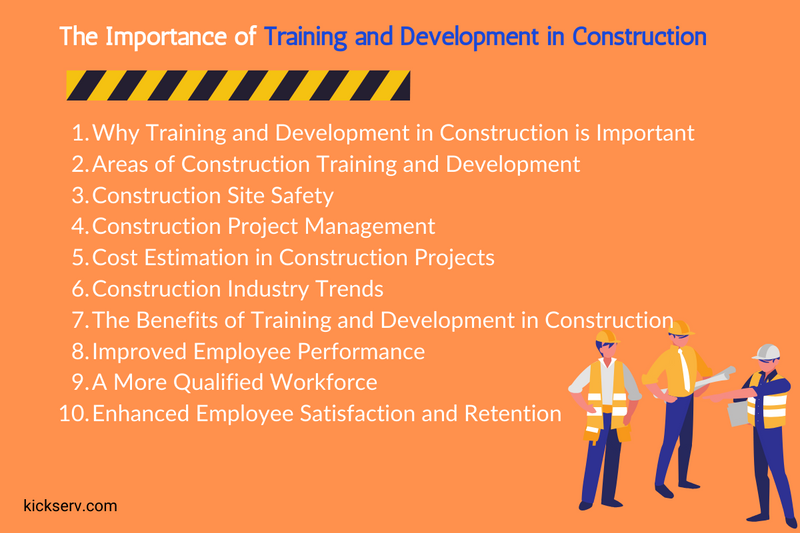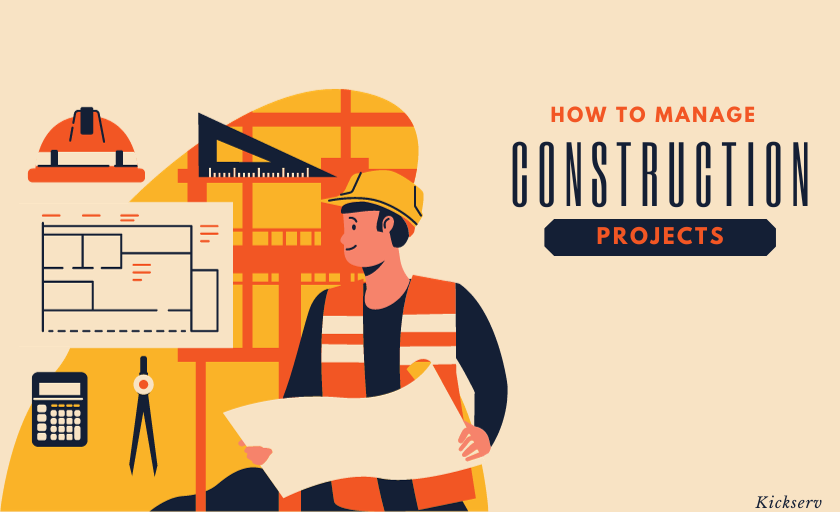
The Importance of Training and Development in Construction
The Importance of Training and Development in Construction
The construction industry is constantly evolving and with the rise of technological advancements and sustainability initiatives, the importance of training and development has become even more vital. Construction workers need to stay up to date with the latest industry trends and techniques to ensure they can meet the demands of clients and deliver high-quality projects.
In this blog post, we will discuss the importance of training and employee development in the construction industry and its benefits to both employers and employees.
Why Training and Development in Construction is Important
The need for qualified personnel makes training and development an indispensable part of any organization that seeks to achieve success, growth, and sustainability. As we continue to see fluctuations in the economy and changes in the workforce, construction companies that invest in training and development will undoubtedly have a competitive advantage over those who do not.
Keeping up with construction industry news and offering professional development opportunities to employees can lead to increased productivity, enhanced safety measures, and improved overall job satisfaction, which in turn benefits both the employee and the company. Companies that invest in employee development and training can improve their overall bottom-line financial performance. By keeping up with the latest construction industry news and trends, businesses can ensure that their workforce is equipped with the necessary skills and knowledge to stand apart from the competition. From new project management techniques to advancements in construction materials and equipment, ongoing training can help employees stay ahead of the curve and improve productivity.
Additionally, investing in things like construction project management software, construction safety training, and professional development courses can bring tangible benefits like reduced costs, improved productivity, and better output quality. Ultimately, investing in employee development can help construction companies maintain a competitive edge and achieve long-term success.
Areas of Construction Training and Development
From specific skills training aimed at addressing skill gaps, to broader professional development opportunities, there are no shortage of areas that aspiring builders can focus their attention on.
By taking a proactive approach to the education and development of their team, construction business owners can ensure that they are ready to confront the challenges of tomorrow’s construction industry, regardless of what that looks like.
Construction Site Safety
Construction sites are known to be hazardous environments, and construction business owners are responsible for ensuring workers' safety. Workplace injury is a major concern in the construction industry, with risks of falls, electrocution, and other accidents.
To mitigate these risks, construction business owners should prioritize safety at construction sites and equip employees with the necessary construction safety training and construction safety equipmentrequired to perform their tasks expertly and without injury.
Some of the construction safety training topics include:
- Proper use of equipment
- Fall prevention
- Fire prevention
- Emergency response
In addition, instruction on how to use construction safety equipment such as safety harnesses and other equipment provided on job sites.
By investing in employee safety training, not only will the job site be safer for workers, but the company can also avoid costly workers' compensation claims.
Construction Project Management
Training and development can aid in project management by teaching construction job foremen, superintendents, and site managers the techniques and tools needed to manage construction projects effectively.Project management training and development can help ensure that construction projects are completed on time and within budget.As construction projects move towards technology-driven solutions, training in construction project management can help teams work together to implement more sophisticated project management software.

Cost Estimation in Construction Projects
A crucial part of any construction project is cost estimation; an essential step for construction business owners to ensure profitability. Construction project cost estimation involves considering all costs related to a construction project, including labor, material, and equipment costs.It also requires a comprehensive understanding of the costs involved in different activities at various stages of the project. Training your team to develop accurate and realistic cost estimates can help avoid losing construction projects or monetary loss associated with inaccurate cost estimates.
Construction Industry Trends
When it comes to construction industry trends, the design and construction process have significantly evolved over the years, leading to structural changes and a new way of thinking for stakeholders. Some of the current trends in construction training and education include online courses, virtual reality (VR) safety training, construction project management software, and usage of 3D printing to improve production quality. Construction companies that invest in these trends will see results in improved efficiency, productivity, and safety across their projects.
The Benefits of Training and Development in Construction
Offering and development opportunities in the construction industry is a win-win for both employers and their employees. Employees gain long-term career advancement while employers gain a greater pool of skilled and qualified employees that can contribute to the growth and profitability of their company.In the long run, investing in your employees is investing in your company's future. When employees feel valued and have the necessary skills and knowledge, the impact on your business is undeniable.
Improved Employee Performance
The construction industry involves unique and often challenging tasks that require specialized expertise and attention. Proper training and development not only help employees improve the necessary skills to perform their duties effectively but also helps keep themup to date with the latest industry trends and changes. By providing employees with relevant training and development opportunities, employers can expect to see improved employee performance.
The results will reflect a better quality of construction work, more efficient project management, fewer errors, and increased productivity.
A More Qualified Workforce
The construction industry is continually changing with emerging technologies, new construction methods, and updated materials. It is essential that employees remain current with these changes to ensure that construction projects are completed efficiently. By offering regular training and development programs, employees will be more equipped to take on new roles and responsibilities, resulting in a more qualified and dynamic workforce. Construction employees with access to ongoing training also tend to demonstrate better problem-solving and decision-making skills, better communication skills, and have enhanced safety awareness.
Enhanced Employee Satisfaction and Retention
Investing in employee development is an investment in their career progression, job security, and future. Employees who receive training and development are statistically more satisfied with their job, which ultimately leads to increased loyalty and commitment to the company.
As a result, there is a higher likelihood that they will remain with their employer longer. By offering training and development opportunities, employers can attract and retain top talent in the industry, which is vital to maintaining a qualified workforce.
Conclusion
Offering training and development opportunities in the construction industry is crucial for employee improvement, job satisfaction and retention, workplace safety, and workforce qualifications. With a more qualified and satisfied workforce, your construction projects will not only be completed on time but also with higher quality and efficiency, increasing your profitability and reputation.Construction businesses that focus on regular training and development activities will have a workforce that demonstrates higher morale, increased productivity, and improved safety performance. It isa solid foundation for a thriving company and a secure future.

Attracting and Retaining Talent in the Home Service Industry: A Guide
In this blog post, we will explore the key factors that impact the recruitment and retention of talent in the home service industry, and provide actionable strategies for businesses to build a strong and sustainable workforce.

How to Manage Construction Projects
Whether you are overseeing a small residential development or large-scale commercial construction, the key to success is in efficient project management.
Never miss a post.
Get notified of new content